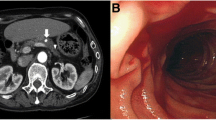Abstract
Background: Hemosuccus pancreaticus, a rare form of upper gastrointestinal bleeding, may complicate chronic pancreatitis and pose a significant diagnostic and therapeutic dilemma. Aim: To present our experience with this potentially life-threatening complication of chronic pancreatitis. Methods: We reviewed our experience with management (both operative as well as angiographic embolization) of patients with hemosuccus pancreaticus complicating histologically documented chronic pancreatitis between 1976 and 1997. Diagnosis of hemosuccus pancreaticus was based on clinical presentation, preoperative endoscopic and radiographic imaging, operative findings, and pathologic evaluation. Results: During the period, we managed eight patients with hemosuccus pancreaticus (1.5% of all patients with chronic pancreatitis treated surgically). Gastrointestinal bleeding presented as hematemesis in three and hematochezia in three, but all had recent melena and were anemic; three of these patients were hemodynamically unstable. Abdominal pain was present in six. When performed, angiography (n=6) was diagnostic of a pseudoaneurysm; computed tomography (n=7) showed a pseudoaneurysm in two and a pseudocyst in five. Endoscopy (n=8) revealed blood issuing from the ampullary papilla in two patients. Operative management (n=6) involved distal pancreatectomy, pancreatoduodenectomy, or total pancreatectomy in two patients each. Angiographic embolization was successful in one patient, but the other died from uncontrollable hemorrhage. Conclusions: Hemosuccus pancreaticus is rare, but should be considered in patients with chronic pancreatitis and gastrointestinal bleeding. In the absence of pancreatitis-related indications for surgery, angiographic embolization can be definitive treatment. If there are pancreatitis-related indications for operation, angiographic embolization may allow an elective operative procedure based on structural changes of the pancreas. If embolization fails, pancreatic resection is usually required, often on an emergent basis.
Similar content being viewed by others
Author information
Authors and Affiliations
Additional information
Received: 23 August 1999 Accepted: 27 December 1999
Rights and permissions
About this article
Cite this article
Sakorafas, G., Sarr, M., Farley, D. et al. Hemosuccus pancreaticus complicating chronic pancreatitis: an obscure cause of upper gastrointestinal bleeding. Langenbeck's Arch Surg 385, 124–128 (2000). https://doi.org/10.1007/s004230050254
Issue Date:
DOI: https://doi.org/10.1007/s004230050254




